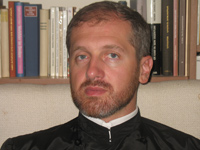
Nume: BENGA Daniel
Tema: Religii, istorie şi societate în Europa şi Asia
Partener: Academia Română, Institutul de Istorie a Religiilor, Bucureşti
Proiect: Identitate si delimitare - Procese de delimitare fată de practicile iudeo-crestine si societatea păgână în crestinismul sirian din secolul al III-lea
Date de contact: daniel.benga@yahoo.de
Descarca Curriculum Vitae BENGA Daniel
Identitate si delimitare - Procese de delimitare fată de practicile iudeo-crestine si societatea păgână în crestinismul sirian din secolul al III-lea
Procesul de delimitare al crestinilor dintre păgâni fată de iudeo-crestinii sirieni, care respectau diferite practici iudaice, este până azi foarte putin documentat. În proiectul meu de cercetare intentionez să analizez procese, transformări si dezvoltări cu rol delimitativ, dar si creator de identitate, în crestinismul sirian din secolul al III-lea, pe baza celei mai importante „Constitutii bisericesti“ din acest secol, Didascalia Apostolorum.
Comunitatea crestină descrisă în Didascalia siriană se află într-o vecinătate plină de tensiuni. Pe de o parte, ea trăieste ca minoritate creștină în interiorul societătii păgâne majoritare si, pe de altă parte, trebuie să dea socoteală de mostenirea sa iudaică. Astfel, autorul scrierii, foarte probabil un episcop (posibil de origine iudaică), dezvoltă o întreagă teorie si strategie, pentru a delimita identitatea crestină a credinciosilor săi atât de societatea păgână, cât si de practicile iudeo-crestine. Prin indicatii teoretice si practice, întemeiate în special pe Sfânta Scriptură, el încearcă să contruiască un ethos crestin, prin care să asigure identitatea membrilor comunitătii sale fată de practicile iudaice si prin care comunitatea crestină să se diferentieze de societatea păgână.
În proiectul meu de cercetare doresc să analizez două puncte centrale ale tematicii Identitate si delimitare, care s-au bucurat de putină atentie în cercetarea de până acum: 1. Interpretarea legii vechi-testamentare, asa cum doreste didascalistul să o impună, si restructurarea serbării Pastelui ca delimitare fată de Pesach-ul iudaic, si 2. Modul în care sunt rezolvate probleme ale vietii crestine de zi cu zi (i/moralitatea băilor publice, interzicerea spectacolelor, primirea străinilor, pozitionarea fată de literatura păgână) într-o într-o societate politeistă majoritară. Aceste două problematici reflectă tensiuni, dar si dezvoltări importante înlăuntrul crestinismului sirian, care contrazic întelegerea predominant statică de până acum a institutiilor crestine din Antichitate.
Ce autoritate stă în spatele acestor procese de delimitare? Cum sunt întemeiate schimbările propuse? Cum sunt interpretate texte autoritative si normative (precum Biblia)? Aceste întrebări si multe alte interogări vor însoti cercetarea tematicii de fată. De asemenea, voi încerca realizarea unei istorii a receptării solutiilor dorite si prezentate de Didascalie, pe baza prelucrărilor mai târzii ale acestei „Constitutii bisericesti“ si a altor izvoare.
În interiorul genului literar al „Constitutiilor bisericesti“ din Antichitate, definit de Alexander Faivre ca „literatura vie a crestinismului“, Didascalia siriană se situează între Didahie (Siria, în jurul anului 100), o scriere din care se inspiră, si Constitutiile Apostolice (Antiohia, aprox. 380), o scriere în care a fost realizată o prelucrare temeinică a Didascaliei apostolilor. O analiză comparativă a problematicii noastre în toate aceste scrieri ne permite să urmărim dezvoltări si schimbări fundamentale ale problematicii proiectului de-a lungul primelor patru secole crestine.
Identity and Delimitation - Processes of Delimitation from the Judeo-Christian Practices and the Pagan Society in a Christian Syrian Community of the 3rd Century
The delimitation process of formerly pagan Christians from the Pagan Society and the Syrian Judeo-Christians who still preserved many Jewish practices, has been little examined until today. In my research project, I intend to analyse the processes, changes and developments which triggered separation, but at the same time created a new identity inside a Christian Syrian community of the 3rd century consisting of pagan and converted Jews, on the basis of the most important „Church Constitution” of this century, namely the Didascalia Apostolorum.
The community described in the Syrian Didascalia is located in a neighbourhood marked by tension. On the one hand, it lives as a Christian minority inside the majority pagan society and, on the other hand, it must account for its Jewish heritage. Thus, the author of the writing, very likely a bishop (probably of Jewish origin), develops a whole theory and strategy, in order to delimit the Christian identity of his believers both from the pagan society, and the Judeo-Christian practices. Through theoretical and practical indications, drawn especially from the Bible, he tries to construct a Christian ethos, through which to secure the identity of the members of his community in the face of the Jewish practices, and to help the Christian community differentiate itself from the pagan environment.
I intend to analyse in this research project two key points of the topic Identity and Delimitation, which have enjoyed little attention in previous research: 1. The unique interpretation of the Old Testament law, as the didascalist wants to impose it, and the restructuring of the Easter celebration, as delimitation from the Jewish Pesach, and 2. The way in which problems of daily Christian life are solved (the i/(m)morality of public baths, the prohibition of shows, the reception of travellers, the stance on pagan literature), in a majority polytheistic society. These two issues reflect important developments and changes inside a Christian community, which contradict the static understanding of ancient Christian institutions which has prevailed until now.
What authority lies behind these delimitation processes? How are the proposed changes justified? How are authoritative and normative texts (such as the Bible) interpreted? These questions and many others must accompany the study of the topic of this project. Moreover, I will try to create a history of the reception of the solutions presented in the Didascalia, on the basis of subsequent interpretations of this „Church Constitution” and other sources.